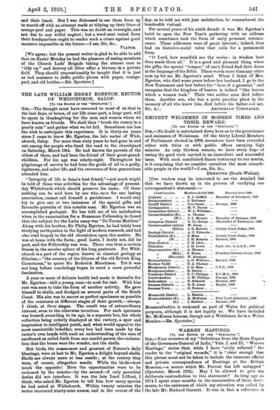THE LATE WILLIAM HENRY EGERTON, RECTOR OF WHITCHURCH, SALOP.
rro THZ EDITOZ Or UTZ " SIMETLIOZ.1
Sin,—The thought must have occurred to most of us that in the last days, or hours, of our life some part, a large part, will be spent in thanksgiving for the men and women whom we have known as friends. We shall then "break the rosary in a pearly rain" and gather what we let fall. Sometimes one has the wish to anticipate this experience. It is thirty-six years since I came to know Mr. Egerton, the late rector of Whit- church, Salop. For more than sixty years he had gone in and out among the people who lined the road to the churchyard on Saturday, March 19th. He had known the parents of the oldest of them, and had been the friend of their great-grand- children. For his age was ninety-eight. Throughout his pilgrimage of service he had been the guide of all to a godly, righteous, and sober life, and the reverence of four generations attended him.
"Integrity of life is fame's best friend,"—yet much might be told of those wise activities for the advantage of present- day Whitchurch which should preserve his name. Of these nothing can be said here by one who, save for one lasting association, cannot call himself a parishioner. I would only try to give one or two instances of the special gifts and favourite pursuits of this notable man. Mr. Egerton was an accomplished geologist. He has told me of his satisfaction when in the examination for a Braaenose Fellowship he found that the subject for the Latin essay was "De Terrae Motibus." Along with his brother, Sir Philip Egerton, he had lately been studying earthquakes in the light of modern research, and had also read largely in the old ohroniclers upon this matter. He was at home with the facts ; good Latin, I doubt not, did its part, and the Fellowship was won. There was thus a certain fitness in the secular sphere of his long pastorate. For Whit- church is a part of the region known in classical geology as Silurian,—" the country of the Silures of the old British King Caractacus," to quote Sir Roderick Murchison. Yet it was not long before conchology began to exert a more powerful fascination.
A year or more of delicate health had made it desirable for Mr. Egerton—still a young man—to seek for rest. With him rest was sure to take the form of another activity. He gave himself to shells, and dredged on several parts of the South Coast. His aim was to secure as perfect specimens as possible of the creatures at different stages of their growth,—alteep,
I think, at three stages. The result was of extraordinary interest, even to the otherwise incurious. For each specimen was housed, according to its age, in a separate box, the whole collection being orderly displayed at the rectory, a spur and inspiration to intelligent youth, and, what would appeal to the most unscientific beholder, every box had been made by the rector's own hands with such an understanding of the uses of cardboard as called forth from one candid person the exclama- tion that the boxes were the wonder, not the shells.
But birds, the commonest and greatest of Nature's daily blessings, were at last to Mr. Egerton a delight beyond shells. Shells are always more or less sessile; at the rectory they were, of course, altogether sessile. While the birds—bow much the opposite ! Here the opportunities were to be reckoned by the minute—by the second—if only parochial duties did not interfere. It was the late Lord Lilford, I think, who asked Mr. Egerton to tell him how many species he had noted at Whitchurch. Within twenty minutes the rector recovered ninety-nine names, and in the course of the day, as he told me with just satisfaction, he remembered the hundredth visitant.
For several years of his ninth decade it was Mr. Egerton's habit to open the New Year's gathering with an address which sometimes took the form of early personal reminis- cence. These addresses were of great interest ; indeed, they had an historico-social value that calls for a permanent form.
" 0 Lord, how manifold are thy works : in wisdom bast thou made them all." It is a good and pleasant thing when the gifts, the special "temper," of one's friend find their dress in the language of the Bible. These words more than any other sum up for me Mr. Egerton's mind. When I think of Mrs. Egerton, who died some years before her husband, I go to the New Testament and bow before the "hem of a garment," and recognise that the kingdom of heaven is indeed "like leaven which a woman took." Their two soldier sons died before them. Another son, who has a quite peculiar place in the memory of all who knew him, died before his father.—I am,










































 Previous page
Previous page